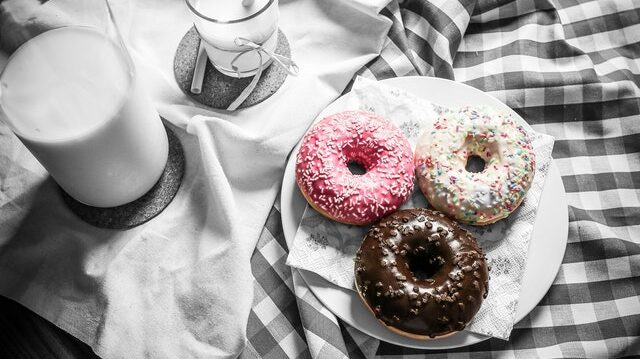By Robin Fein Wright, L.C.S.W.
To people with type 2 diabetes who also struggle with compulsive eating, please know you are not alone. According to the Walden Eating Disorders Treatment Program, it is estimated that 12% of patients with Type 2 Diabetes also suffer from Binge Eating Disorder. Given that 9.3% of the population has diabetes, this is a dual diagnosis that affects millions of people in the United States.
What is Compulsive Eating?
Compulsive eating is considered an emotionally triggered behavior, usually a response to an uncomfortable feeling, not to physical hunger. Here are definitions of emotional eating from WebMD:
- Something stressful happens to you and you immediately want to eat.
- An overwhelming urge to eat comes over you (physical hunger usually builds more slowly).
- You strongly desire one particular food like chocolate or ice cream rather than a variety of foods.
This kind of eating makes many people feel like they have no control over what they eat. There is guilt and shame over the quantities of food consumed. Many compulsive eaters prefer to eat alone because it’s more of a solitary act than a social one. People who eat compulsively often don’t pay close attention to the act of eating and can eat almost automatically because it is emotionally driven. It is hard to read hunger signals to know when to stop eating because the behavior is not driven by physical hunger.
Another factor in developing compulsive eating is body dissatisfaction. Compulsive eating is part of a behavioral cycle that begins with an effort to be restrictive in order to lose weight. According to Michelle May, MD, it is the “eat, repent, repeat” cycle. If you restrict food, you hit a breaking point and binge on “forbidden foods,” then feel guilt and shame. Then, the restriction begins again. If you use food as a coping tool and then you make it off limits, that is a recipe for continual frustration & disappointment.
Challenges of Emotional Eating for PWDs
The challenge for the person with diabetes is that the ideal approach for treating compulsive eating can conflict a bit with the typical recommendation for managing diabetes. For people with type 2 diabetes, healthy eating and weight management are cornerstones for managing the progression of the condition. We have been told endless times that to improve our diabetes, we must be focused on our weight and keep a careful watch on consumption of sugar and carbohydrates. For compulsive eating, this emphasis on control and therapeutic “restriction” can have an opposite effect. The more we are told to be in control, the more we can be triggered into being out of control. To address compulsive eating, the treatment approach is to normalize foods. A food is not bad or forbidden (in diet lingo, there is no “cheating”). The effort is to create a balanced diet and to nourish yourself with all kinds of food. So what should a person with diabetes do?
Healing Your Relationship With Food
Here are strategies for creating a foundation for reframing food as a friend, not an adversary and to give you more control over compulsive eating.
Eat enough. Make sure that you’re eating throughout the day. Fuel your body with nutritious food and eat smaller, balanced meals and snacks to avoid getting overly hungry. Getting too hungry should be avoided because it can drop your blood sugar and make you feel deprived and lead to impulse eating.
Plan ahead. Set up a plan of eating each day so that you are eating at regular intervals. If you follow a reasonable schedule with foods you like, it makes decision making about food less stressful.
Experiment! Try different nutritious foods and recipes to avoid boredom or feeling derived. Healthier food can be extremely satisfying but it can take some planning ahead and a little preparation.
Slow down. Slow down when eating so you have time to really taste your food and enjoy it. Make it pleasurable!
Get off the roller coaster. Often, when we eat compulsively we want to hide it and use it as a way to avoid diabetes altogether. We stop testing our blood sugar, neglect self-care and skip medications. It is REALLY important to move past all-or-nothing thinking. If you’ve over-indulged, all is not lost. Don’t quit taking your medications. Just try to return to healthy routines as soon as you can. Let go of the guilt or judgment of yourself as a failure… Tomorrow is a new day.
Check in with your body. When you feel like eating, pause and ask yourself “Am I hungry?” If we eat for emotional reasons, we need to stop and tune into our bodies to cultivate awareness of hunger and satiety cues. If you’re not physically hungry, can you pause and not follow the impulse to eat? Are there other things that you could do instead? Make a list of activities that you find pleasurable or comforting that you could do instead of eating– for example, going for a walk, calling a friend, reading a book or magazine.
Avoid depriving yourself. Feeling deprived or overly restricted is a huge trigger to eating compulsively. Work with a diabetes educator to figure out how to incorporate your favorite foods into your meal plan. With the right size portion and a well-balanced plate, you can eat still eat the foods you love.
Find support. Dealing with diabetes and food issues is much easier with the support and encouragement of other people. Often, emotional eating occurs because we don’t have a safe place to talk about our feelings, and so we eat in order to push them down. Finding a therapist or psychologist who you can talk to about what you’re feeling may help this a lot.
Practice compassion. Lastly, try to stay focused on loving and accepting yourself just as you are. Remind yourself that no one is perfect, and having diabetes is not easy. Recognize the areas where you are successful (perhaps you’re consistent with your exercise routine or you take your medications without fail), and don’t give up on trying to improve the areas where you want to grow.
Healing your relationship with food IS possible with patience and the willingness to be compassionate towards yourself. It will take time, but the journey is worth it.
The medical information on Diabetes – What To Know’s website is provided as an information resource only. The content is not in any way intended to be nor should you rely on it as a substitute for professional medical evaluation, diagnosis, advice and treatment.

